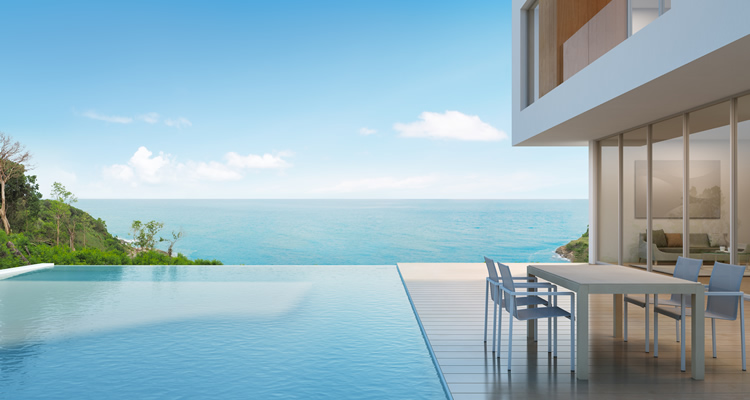Owning a holiday home overseas can be a great investment in terms of generating a steady income and having somewhere to escape to when the British weather’s getting you down.
However, while it’s relatively easy to keep your ‘normal’ home in good working order, maintaining a holiday home from a distance takes a bit more work.
In this article, we’ll be looking at what you can do to keep a holiday home in tip top condition all year round.
Make sure everything is running smoothly
One of the most basic things to keep an eye on is that waste water routes (including drains and gutters) are not blocked and won’t become blocked.
Leaf guards can prevent blockages during autumn and winter, while gutters can also be protected with similar anti-leaf measures. You may also want to get a neighbour on side who can check up on things in your absence.
If you need to deal with moisture inside the home, a low-energy dehumidifier can prevent condensation building up, but ensure that it has been properly tested before leaving it running.
On a similar front, keeping frozen water pipes from bursting is also something to consider if the property won’t be occupied over winter. Turning the central heating completely off may seem like a good idea, but it is actually better to leave it at a low temperature, in the 7°C to 15°C range. Another pressure-easing measure is to leave taps dripping during winter months – although this might drive up your water bills!
Keep your cool over fire risks
Unless an electrical device is left running, the odds of a fire starting while the property is unoccupied are fairly low. There are factors that can pose a risk if left unchecked, however.
These include ovens, which should regularly be cleaned of built-up grease or fat; both are highly flammable. In a similar line, if the property has a chimney it should be swept at least once a year, certainly before the first fire is lit in the autumn.
On a more general note, regularly checking that all electrical devices are functional and safety-checked is a good way of reducing the fire risk. Additionally, making the holiday let non-smoking can be a simple solution to limiting the fire risk; this also prevents the build-up of unpleasant odours.
Clean up on changeovers
When guests have checked out of your property and new arrivals are on the way, having a clear plan for the changeover is crucial to keep everything running smoothly.
If you’re managing the property from overseas and want local cleaners to handle the job, this means setting a schedule and having a clear list of all the work that has to be carried out.
Providing the cleaners with a checklist of what needs to be washed, cleaned or replaced can be helpful.
Some tasks, like washing bed linen, take longer than the changeover might allow, so ensure that there is plenty of backup linen on hand as well as replacements for any toiletries etc.
Batten down the hatches in winter
This step applies if the holiday home is going to be unoccupied during the winter months, or is located in an area prone to bad weather.
Securing the property against the elements is key to having it stand the test of time. This can range from making sure that nothing can blow away in a severe gale, to ensuring that the roof will stand up to severe downpours.
If the property has a garden or large trees in the grounds, making sure that these are maintained is also important. In both cases, hiring a gardener can be an easy solution. As well as keeping flowers flowering and grass cut, gardeners can also pre-empt trees growing into power lines or identify those that might be in danger of falling.
Keep your property safe and secure
The final tip might seem like an obvious one, but as the let could be remote or unoccupied for a sustained period of time, it is perhaps the most important.
Keeping the home secure is key, both to deter would-be intruders but also to let guests feel safe on their holidays.
Solid door and window locks are the first place to start; locksmiths can offer a range of options but the strongest lock is usually the best option.
An alarm system is also a good idea if you want to feel confident about the property in your absence. As well as making a lot of noise to terrify burglars, a system that dispatches security companies or notifies the local police can be an added bonus.
Other defences are more passive – security cameras and motion-triggered lights can act as a further deterrent to potential criminals.
At the extreme end of the scale, something as imposing as steel shutters might make your property look like Fort Knox, but may be worth investing in if you have high value items you’re concerned about.









